Mayday interview: iconic Asian rock band return to Sydney for 25th anniversary
They’re rock superstars in Asia. Here? Not so much. With its penchant for the spectacular and a world-beating live show, can Taiwanese quintet Mayday bring Australian audiences on board?
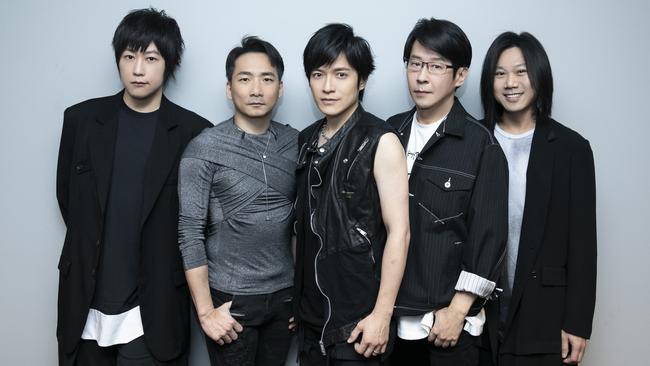
Five young men bond over a shared love of The Beatles, form a band and seek to change the world through their uplifting blend of rock and pop music — just like their heroes from Liverpool managed to do, despite the odds against them.
Plenty of groups around the world have fulfilled the first two steps, but few manage to accomplish the crucial but devilishly tricky task of finding and maintaining an audience.
Taiwanese quintet Mayday is one of those rare groups to have completed the trifecta, emphatically. Now 25 years into their career, these musicians have long since achieved superstar status in their home country and throughout much of Asia.
Just how big is this band? In May 2024, it set a record by performing 10 consecutive shows at Beijing’s National Stadium — the main venue of the 2008 Olympic Games, dubbed the Bird’s Nest — to about 80,000 fans per night.
When you’re selling about 800,000 tickets at a single venue within the space of a fortnight, you’re in rare air indeed.
Almost every summer since 2012, in fact, Mayday has been playing lengthy, visually spectacular and artistically demanding concerts at that same venue.
It has now played 30 shows there, totalling more than 2.4 million tickets sold at the Bird’s Nest alone — an unparalleled feat which has solidified these five artists as the undisputed kings of Mandopop, or Mandarin language pop music.
Two more data points of note: the band’s ninth and most recent album, 2016’s History of Tomorrow, recorded more than 200 million digital sales in Taiwan and China alone, according to Alibaba’s Ali Music Group — an extraordinary number that made it one of the world’s best-selling bands, as reported by Billboard magazine in 2017.
And during the Covid pandemic in May 2020, when it held an audience-free concert inside an empty Taipei Municipal Stadium — the same venue where its first major gig was held in 1999, to coincide with its debut album release — more than 42 million fans tuned in to watch the live stream.
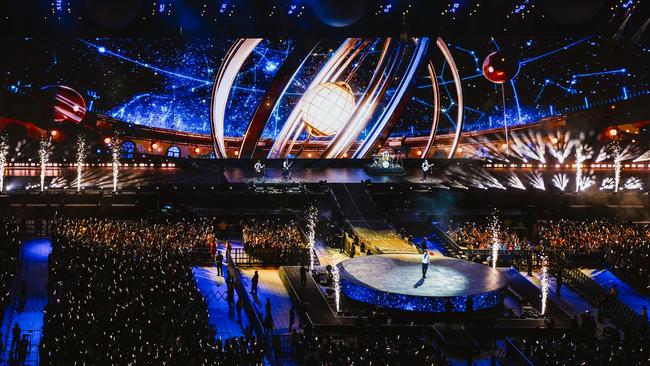
The closest analogs among English language stadium rock acts working today are Coldplay — the British band whose ongoing Music of the Spheres world tour has made box office history, with a record 10.3 million tickets sold since 2022 — as well as cultural mainstays U2 and The Rolling Stones, the latter of whom continues to rage against the dying of the light by strutting on stages, including another 20 US stadium concerts last year, after more than 60 years in show business.
Although the band has visited Australia five times previously — most recently a sold-out, three-show run taking in Qudos Bank Arena (Sydney) and Rod Laver Arena (Melbourne) in May 2023 — Mayday are far from a mainstream proposition here.
To state the obvious, part of the reason is that the language gap is significant. Mandarin is Australia’s second most commonly spoken language after English; some 685,000 people reported it as their preferred language at home in the 2021 census, or about 2.7 per cent of the population.
Yet it remains a tough ask for most Australians to engage with pop music performed almost entirely in a foreign language, particularly at a time when the domestic recording industry is having a hard enough time enticing Australian ears to listen to Australian sounds, with listening habits increasingly skewing toward American and British artists in the streaming era.
In recent years, Asian pop and rock acts have begun visiting our shores more often, thanks to entrepreneurial pushes from major promoters such as Frontier Touring and Live Nation, who have sensibly come to see our island as an extension of the Asia Pacific region rather than a solitary outpost occasionally paired with New Zealand to sweeten the touring profit pot.
In turn, those promoters’ relationships with booking agents and managers have convinced big-name Asian acts to take a punt on hosting shows here. As a result, these artists’ visibility in the marketplace has increased significantly, and it’s now commonplace to see Eastern acts appearing alongside more familiar Western names as you browse concert calendars, particularly at arena-sized venues, where acts such as Blackpink, Stray Kids and Twice have proven time and again that there’s a strong demand for Asian sounds to be performed here.
Befitting their status as Mandopop royalty, however, Mayday will soon make the biggest play of its career in the Australian market: on February 22, it will become the first Mandarin-speaking rock band to headline Sydney’s Accor Stadium, the same venue where the likes of Taylor Swift, Coldplay, The Weeknd and Ed Sheeran have all set up shop in recent years to present their songs before crowds of up to 80,000 fans.
When asked how the band and its production team were preparing for that pioneering feat in Sydney, bassist Masa (aka Tsai Shen-Yen) replies, “It’s quite a challenge, because the stadium is quite big, and we never play in a stadium outside Asia. Because in the show, there are so many videos and to us, it’s very important for the audience to understand what we try to say in this show. We don’t want to cut any pieces of the show, so there are going to be 80 (shipping) containers of everything to build up in a stadium. That’s a very huge, full set. It’s challenging to us, and also we are…”
“Thrilled,” interjects guitarist Stone (aka Shi Chin-Hang), accompanied by a stony-faced expression.
“A little bit worried,” continues Masa with a smile, prompting laughs from all five band members. “Actually, a little bit worried about the big stadium: can we put everyone there? Or is it going to be, ‘Why is this place empty?’ But we’ll do our best.”
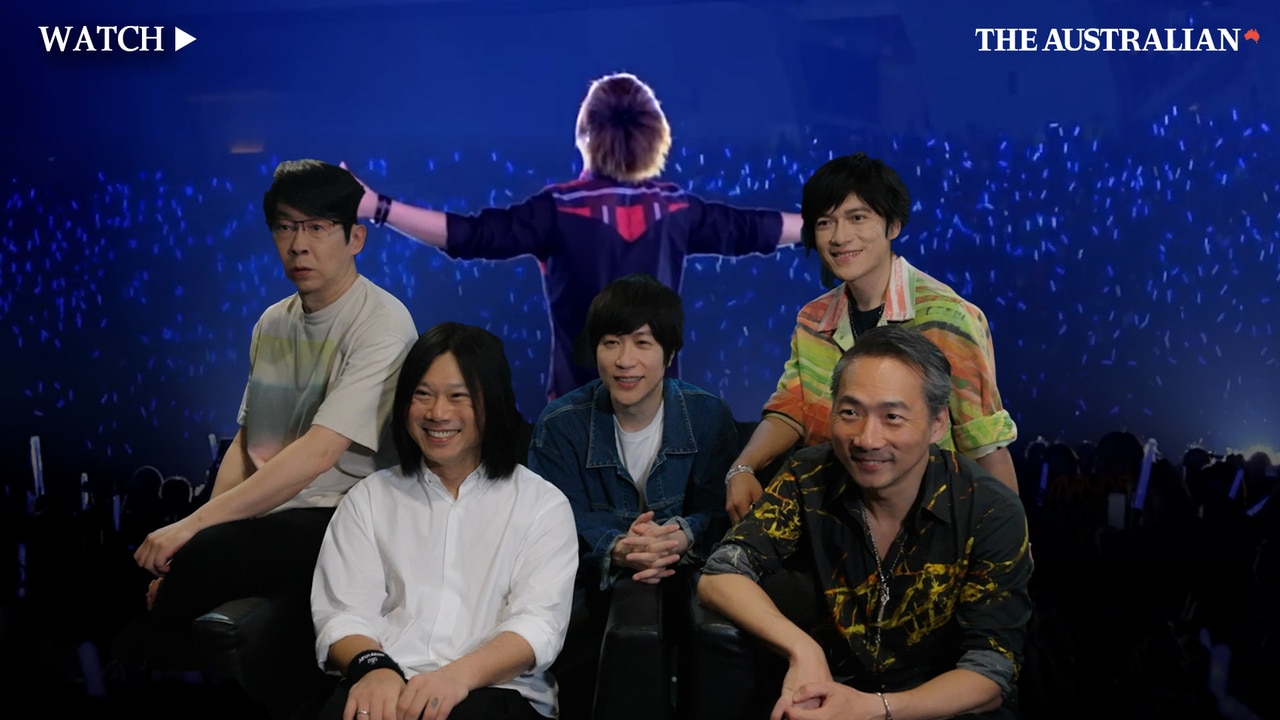
When Review travels to see the band stage the first of two sold-out concerts at Singapore National Stadium ahead of a backstage interview, it’s a typically moist mid-January evening amid its monsoon season: high humidity grips the city-state like a wet blanket, and constant rainfall makes all involved grateful for the venue’s retractable roof.
What’s immediately apparent is the unusual stage footprint: rather than the regular format of setting up at one end of a rectangular stadium and projecting to the three remaining grandstands, Mayday has instead built the widest stage Review has ever seen.
At about 90m, it takes up almost the full length of the pitch and faces three seating tiers, plus those on the floor in front of them. The same production approach will be taken at Sydney’s Accor Stadium, before about 50,000 seats; why, exactly, the group decided on such a strange format isn’t apparent until midway through the show.
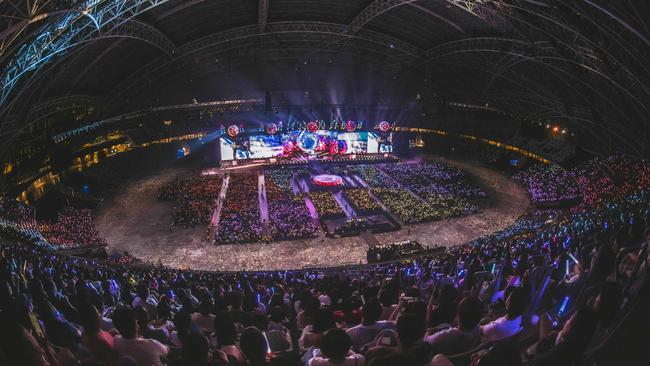
In concert, Mayday’s music varies from hard-edged rock ’n’ roll to pretty acoustic ballads, with a firm basis in classic pop songwriting and an emphasis on major-key melodic choruses. Almost all of the music is played live, with occasional keyboard parts and string embellishments either performed offstage or mixed in from tracks.
Singer Ashin (aka Chen Shin-Hung), 49, is a vocal wonder, with a beautifully clear tone that’s pushed high in the mix, and his charismatic abilities as a frontman has evidently been a major factor in the band’s success.
Among the 40,000 or so in attendance, fans of all ages brandish lightsticks which are linked to a smartphone app to ensure they pulse in time and in the correct colour for each song, while the structure of the concert itself uses a “time machine” device — taking the form of a giant LED sphere — to link songs from its 1999 debut album through to today, with plenty of interstitial videos shown on the three stage-spanning LED screens.
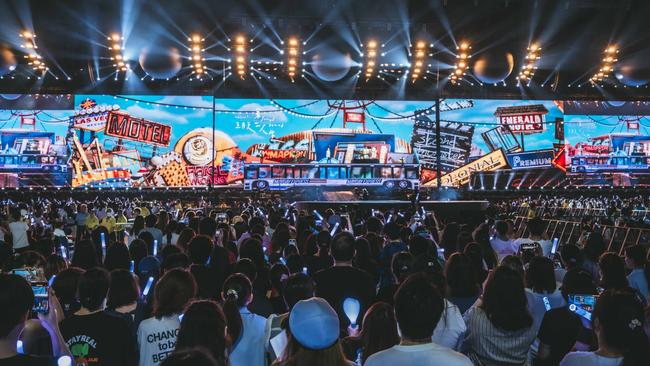
A major reveal arrives 80 minutes into the show when the band transitions from sitting atop a tour bus on stage, to performing live on the top of actual full-size bus, complete with drum kit, musical equipment and high-definition cameras. The bus — dubbed the Mayday Express — slowly laps the stadium and pauses at the corners of the floor, so that the once-distant band members are now right there in front of us in the stands, thereby collapsing space in a remarkably effective and unique production decision.
This segment runs for about 20 minutes, and it’s a real moment of unity amid an otherwise compelling spectacle.
The Singapore concert is a marathon approaching three and a half hours, and the members elect to down their tools on several occasions for extended inter-band conversations, microphones in hand, as they reflect on their 25-year journey and repeatedly thank their fans for giving them a life in music.
The concert is a similar style of presentation to the band’s highly stylised and expertly produced music videos, as well as its extensive ventures into feature-length films, which include both concerts (three releases) and documentaries (two).
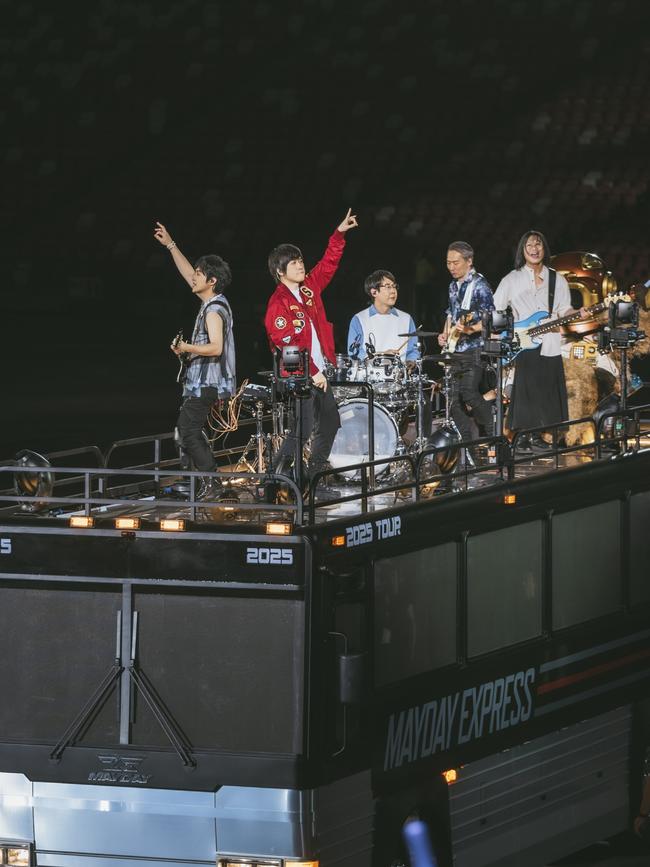
These casual onstage chats are rapturously received by fans, who appear to hang on every word, laugh at all the jokes, and otherwise bask in the five members’ distinctive personalities, which have been honed and perhaps hammed up across their career.
It’s such a polished, prolonged and skilfully delivered concert that by the time the band farewells the crowd, after playing more than 40 songs from its nine albums, you wouldn’t blame any of the musicians for retreating to an ice bath, comfortable bed or basically anywhere other than the bowels of Singapore National Stadium.
Yet not long after the final fireworks explode overhead and the glowstick-waving hordes head for the exits, Review is led into a small, black-curtained room backstage to meet the musicians.
Although they’ve changed out of their stage clothes, they’re still exhausted and sweating a little. It’s a mark of their professionalism — and a desire to fill every available seat inside Accor Stadium, no doubt — that instead of fleeing, the quintet has opted to sit for its first major interview with an Australian media outlet.
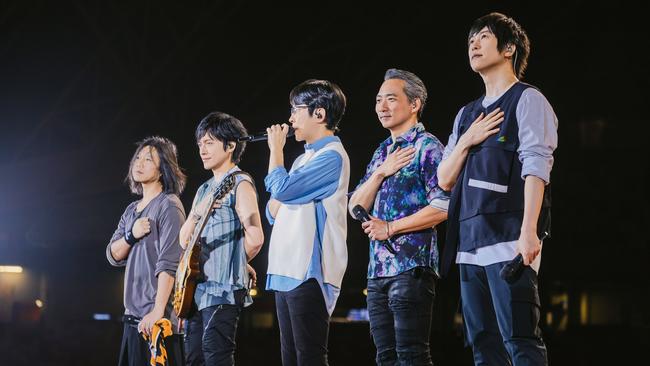
It’s a peculiar feeling to meet a very famous band with whom you share no cultural history. Were this a Western stadium rock act such as The Rolling Stones, U2 or Coldplay, there would be years of musical engagement and immersion in play, all of which can cloud or affect an interview by setting nerves alight in the lead-up to entering the room where it happens.
Yet since Review is a newcomer to Mayday — having taken this trip to learn about its music and its story for your benefit, dear reader — there’s no sense of starstruck trepidation, which seasoned journalists try not to admit they feel in such situations, where the clock is ticking once the recorder’s red light flicks on.
While a phalanx of a dozen or so handlers stand silently behind Review, and a camera and lighting rig is set up to capture this momentous press interaction, the band members are perched around two black arm chairs, with Ashin appearing to draw the short straw by kneeling uncomfortably at the back.
Ahead of the meeting, we were told that only guitarist Stone had good English, yet when we begin by asking him how it feels to step off the stage after delivering such a lengthy show, to our great surprise the bassist instead replies with confident articulation.
“Most of the time, we should be excited — but if you have a tour for months, there are going to be 10 or 20 concerts every month, so we have to come down very quickly, because maybe you have another concert tomorrow,” says Masa, 47. “You have to keep your body and your mind to a very peace (state), so that you can prepare for the next day. Maybe 20 years ago, when we were young, most of the time we went to a hot pot, or had some nice drinks. But now, we are ageing, so… (his bandmates laugh). And there are more and more concerts, so we try to prepare ourselves after the concert.”
As for the comedown routine? “I think everyone is different,” the bassist replies. “For me, I will come back to my room and don’t listen to any music; no more sounds in my room. I’ll have a bath, and maybe drink some wine.”
“Wow,” says Stone, 49, who appears to be judging his bandmate.
“You too?!” asks Masa, gesticulating at his offsiders.
“No,” says Stone. “We are, like, really good students.”
“We drink water; sometimes, sparkling water,” says guitarist and band leader Monster, aka Wen Shang-yi, 48.
“OK, OK; you are the good student, I am the bad student,” says Masa, acting playfully indignant. “My bad, OK?”
It’s clear that there’s a witty repartee in play; musicians still in performance mode, and hamming it up for the camera and the visiting journalist (except for drummer Guan You, aka 51-year-old Liu Yeh-Ming, who stays stoically silent throughout).
It’s another glimpse at the warm onstage banter seen earlier, and a window onto that rarest of traits among veteran bands: artists who still enjoy each others’ company after all these years.
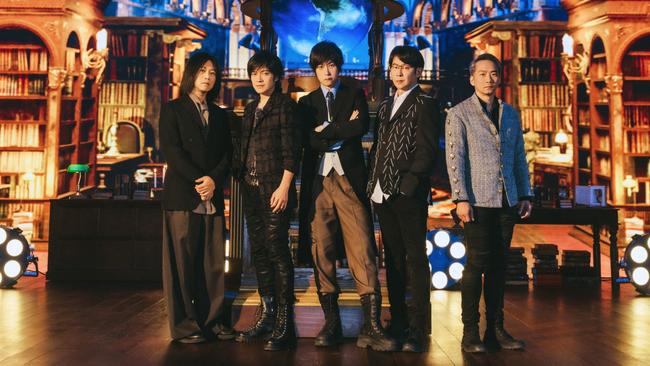
The concert’s “time machine” device suffused the stadium with an odd sense of living nostalgia: photographs and music videos from their early career played on the giant screens behind them as the older, wider musicians played songs written as much younger men. What do they see today when they look at those images?
“I think it’s a reminder to us how we started to make music,” replies Stone. “Because our original feeling is still the same, no matter how we look. I think even the older albums, it looks different, every period — but we still have that the same feeling to make music and to communicate with the audience within the music. I think it’s still the same, even (though) we are getting older, or I’ve got grey hair, or we look slightly different. We’re still the same.”
Asked whether those guys in the old photos — friends who either met in high school, or at university, before this five-strong line-up solidified ahead of the 1999 debut album — could have imagined they’d be regularly staging such super-sized shows, Stone shakes his head.
“Never,” he says. “We never think about that before, because we started performing in a pub, and only one person was there — the owner of the pub. We have stood on the street and there’s no-one, and it’s pouring rain, and no-one wants to listen to us. We never think about that kind of concert (to) continuously drag so much people before (us). No, never. But we appreciate that very much, and so we would like to sing more; to let them know how we like the music; how our passion and our enthusiasm is on the music.”
Watching them on stage earlier, without knowing a word of Mandarin, what shone through was their deep connection. When asked what they’ve learned about staying friends within a band for 25 years, the playful banter returns.
“We are never good friends,” says Stone.
“It’s just all about business,” offers Monster.
“It’s just show business, you know?” says Stone.
“Written on the contract!” adds Masa, prompting them all to laugh. “No, I think because we started in school, we were classmates, club mates, so we’ve really known each other for a long time,” says Stone, turning serious.
“The best way to keep going is after the concert, we actually give each of the band members some time of peace — ‘peacetime’ — because we know we’re going to have another concert on the stage, and we’re going to have an adrenaline time for (the) whole night. So sometimes, after a concert at the weekend, we will leave all the band members silent and peace for their family. I think that’s a way to keep us going.”

Drawing towards the end of our time together — before they fall into silence and peace until tomorrow, when they’ll do it all over again at this stadium — we ask about the future.
Earlier, Stone had mentioned a desire to perhaps include English translations of their lyrics on screen at the upcoming Sydney show, as a way to entice more Australians by gaining a greater understanding of their songwriting, which generally circle themes such as the passage of time, love, family and their life experiences.
The guitarist had said he hoped the band could eventually celebrate milestones marking its 30th and 40th anniversary; perhaps even its 50th. How far into its future is Mayday looking for where to take its music next?
“I think we always want to achieve the achievement of The Beatles — but they break up,” says Stone.
“That’s OK — we don’t have Yoko Ono,” jokes Masa.
“But The Rolling Stones are still singing right now — so I think if they can keep singing, then Mayday should not stop. U2, also.”
All of which leads us back to where this article began, with four young men from Liverpool who formed a band and changed the world. Asked what The Beatles’ music has meant to Mayday’s own music-making, Masa’s tired eyes light up.
“I think that’s the main gate of the music to us,” he replies. “When we were in high school and beginning learning guitar, The Beatles’ music told us what music should be like: it sounds so sounds easy, but actually, it’s not. They try to put many different informations in the lyrics, and do many different kinds of experiments in the music. That’s why it made me think, ‘Wow — so maybe I can play music like this. I can enjoy music like this.’ To us, it’s a very, very important idol, or icon, for everyone in Mayday.”
Before we part ways, asked for any final thoughts to share with curious Australian readers, Stone seizes the nettle.
“I think give Mayday a chance,” replies the guitarist. “If you only speak English, come to our concert and you’ll know that, in the music, there is no language boundary. We can all sing the same language — it’s called music.”
Mayday will perform at Accor Stadium, Sydney on February 22. The writer travelled to Singapore as a guest of Live Nation.





To join the conversation, please log in. Don't have an account? Register
Join the conversation, you are commenting as Logout